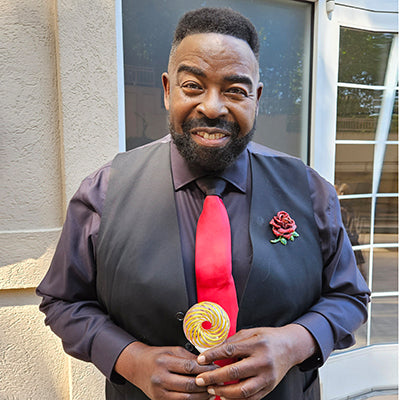Upcoming Event:
Generative AI in Healthcare
Upcoming Event
Register for this exclusive MCiM-hosted gathering of thought leaders, researchers, and practitioners at the forefront of AI innovation to explore algorithmic biases and fairness in AI-generated content.
Are You Ready to Join the Next Class?
Meet Stanford's MCiM Admissions Team
Join Associate Director Tatiana Hummel and Education Program Specialist Lisa Dawdy as they provide an in-depth overview of the Master of Science in Clinical Informatics Management (MCiM) program and its unique integration of Business, Technology, and Healthcare.
Drive the Future of Translational Medicine
A One-Year Master’s Program for Biomedical Research, Clinical, and Industry Professionals
Bring promising new therapies, diagnostics, and vaccines to life. Explore Stanford’s Master of Science in Translational Research and Applied Medicine (M-TRAM).
Research Leadership
Master the problem-solving skills, competencies, and strategies to thrive in the
fast-growing translational research industry.
Applications Open Mid-September for the 2026–2027 Cohort
Questions about the program, financial aid, scholarships, and career paths?
Schedule an appointment with an MCiM team member.
See How M-TRAM Has Transformed Careers, Perspectives, and Leadership Potential
May Stanford medical students apply?
Yes! Please contact us at mciminquiry@stanford.edu to get additional details about applying as a currently enrolled Stanford medical student.
From Eligibility to Career Outcomes. What Future MCiM Leaders Want to Know
Does MCiM offer scholarships?
MCiM is a new program at Stanford University, and currently does not have department-based scholarships. Sources of funding for graduate education range from government agencies to academic departments and schools. Please visit the "Tuition & Financial Aid" page to learn more about the financial options that are offered at Stanford.
How much professional experience do MCiM students have?
In recent years, the program has had a student body with half being "mid-career" professionals with 3–15 years of experience and a quarter being "early-career" professionals with less than 3 years of experience. The remaining students have over 15 years of experience, classifying them as "senior-career" professionals.
May DACA or undocumented individuals apply?
Yes, undocumented student may apply. Stanford is committed to a welcoming and supportive environment for all students, faculty, staff and scholars, and it provides services and support to them without regard to their immigration status, religion, nationality, ethnicity or other characteristics.
May I get an exemption from submitting a TOEFL score?
TOEFL is required unless you hold a degree from a qualifying English-language institution in the US or an equivalent degree from an English-language university in Australia, Canada, Ireland, New Zealand, Singapore, or the United Kingdom. U.S. citizenship doesn’t exempt you. The online app system auto-applies exemptions.
What is the minimum eligibility to apply?
Applicants must hold a bachelor’s degree from a U.S. college or university accredited by a regional accrediting association. Applicants from institutions outside the U.S. must hold the equivalent of a U.S. bachelor’s degree from a college or university of recognized standing. Stanford University also requires a minimum proficiency in English.
Do I have to have a bacelor degree?
Yes, applicants must hold, or expect to hold before enrollment at Stanford, a bachelor’s degree from a U.S. college or university accredited by a regional accrediting association. Applicants from institutions outside the U.S. must hold the equivalent of a U.S. bachelor’s degree from a college or university of recognized standing.
How much does it cost to apply?
There is a $125 application fee, this fee must be paid via credit card. Fee waivers may be available.
For more information, please visit our Information Page.
Bring your skills, your curiosity, and your drive — M-TRAM will equip you with the knowledge, network, and experience to lead meaningful biomedical innovation.
Advance promising biomedical solutions in academic and industry settings – from early-stage research to full regulatory approval.
Patient Impact
Healing The World Together
©2025 Stanford Medicine
From Eligibility to Career Outcomes—What Future M-TRAM Leaders Want to Know
For more information, please visit our Information Page.
How do I know that M-TRAM is the right degree program for me?
Are you interested in translating scientific discoveries and clinical applications into practical solutions that improve and save lives? Whether you are a physician who wants to make connections between patient care and basic science research, or a research professional, or you recently graduated from college and plan to apply to medical or graduate school: M-TRAM will help you extend your knowledge and connections and provide you with the essential tools to build an exciting career in the rapidly growing field of translational medicine.
What are the minimum eligibility requirements?
Minimum requirements are:
- A Bachelor’s degree from a recognized university (or its international equivalent)
- CV/resume outlining previous clinical and/or basic research experience
- Undergraduate and and/or graduate transcripts
- Three letters of reference
- Statement of intent
M-TRAM is open to individuals from a variety of educational and professional backgrounds. We aim to have a student body that brings a diverse set of perspectives and experiences to the cohort.
If you are a foreign national coming from a country where the primary language is not English, you must take the TOEFL test to meet the university’s minimum requirements for English proficiency.
How many hours of coursework, research, and on-site work should I plan for?
M-TRAM is a fulltime program. Approximately 14 hours per week are required for in-classroom learning, and additional 5–10 hours per week are devoted to independent research capstone project (TRIP) and rotations.
How much research and / or professional experience do M-TRAM students have?
The M-TRAM student profile is diverse, with MDs, PhDs, MBAs or recent college graduates represented in the cohort. Therefore, research and/or professional experience varies by individual. Some students have research experience but not clinical experience and others have only clinical experience. Some of our prospective students are biotech/pharma professionals. Others are academic research assistants, physicians, medical students or business, legal or medical professionals.
Can I continue to work while enrolled in the program?
Yes, the M-TRAM coursework is designed to be flexible, allowing students to work part-time while enrolled, especially if their role aligns with translational medicine and potentially with their capstone project.
If your current job is unrelated to translational medicine and you do not plan to base your capstone on that work, we recommend limiting outside work to no more than 20 hours per week.
Does M-TRAM offer financial assistance?
M-TRAM is a self-funded program and does not offer financial assistance. Students can explore a range of options for funding their education, among them loans, external scholarships, and governmental support.
Join Us on Jun 11, 2025, at 5:00 PM PT for an Exclusive MCiM Director Information Session
Join Dr. Kevin Schulman, Program Director of Stanford’s Master of Science in Clinical Informatics Management (MCiM), for an in-depth overview of how the program integrates business, technology, and healthcare to drive real-world impact. The session will also cover key admissions deadlines, requirements, and strategies to strengthen your application.
Register in advance and feel free to share with others who may be interested.
What You’ll Gain as Part of this World-Class Program:
Why Choose M-TRAM?
M-TRAM harnesses Stanford’s unparalleled strengths in basic and translational research, bioengineering, biomedical technology, and business.
Translate scientific discoveries into real-world solutions that improve patient care.
Master regulatory knowledge to design and manage transformational clinical studies.
Work with top-tier academic and industry experts and build life-long collaborative networks.
Lead multidisciplinary research projects using leading-edge management strategies.
Build recognition and open doors to new career pathways in translational medicine.
One of only a few such one-year programs at a top-ranked U.S. university, M-TRAM offers flexible classroom learning, hands-on clinical research and biotechnology training, and mentoring by renowned Stanford scholars and top industry executives.
Pursue new opportunities in academia and R&D, or portfolio, marketing, clinical,
quality, and regulatory areas.
Career Progression
The Program Is Ideal for:
Applications for the 2026–2027 cohort are now open.
M-TRAM is committed to building a dynamic cohort representing a wide range of demographic, cultural, and professional backgrounds.
Ready to accelerate your leadership in biomedical innovation?
Take our short assessment to see if Stanford’s M-TRAM program meets your goals.




























